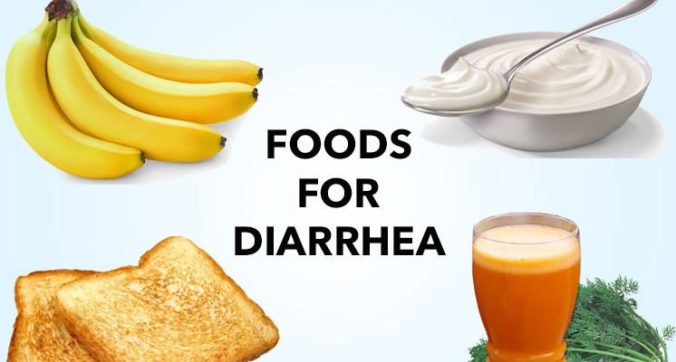Do stick with bland foods. One tried and true diet for diarrhea is the BRAT diet: bananas, rice, applesauce, and toast. Low in fiber, bland and starchy, these foods can help replace lost nutrients and firm your stools. According to the National Institute of Health’s National Institute of Diabetes and Digestive and Kidney Diseases (NIDDK), you can also try boiled potatoes, crackers, or cooked carrots.
Do eat small meals. Too much food will stimulate your gastrointestinal tract to move even more and possibly worsen the diarrhea. Eating five to six small meals, rather than three large ones, can give your intestines a chance to digest the food more easily.
Don’t eat fried food. Prepare foods like beef, pork, chicken, fish, or turkey by baking or broiling, not frying, which can worsen diarrhea. Cooked eggs are okay, too, according to the U.S. National Library of Medicine.
Do eat when hunger strikes. Listen to your body and don’t force yourself to eat, which can worsen symptoms. Trust your body to tell you when — and how much — it can tolerate.
Don’t eat fruits and vegetables that cause gas. Eating gassy food when you have diarrhea can increase intestinal gas and should be avoided. This includes fruits and vegetables, like prunes, berries, beans, peas, broccoli, corn, and green leafy vegetables, and sweet foods like cookies or cakes.
Don’t eat dairy if your diarrhea is severe. For people with lactose intolerance, dairy causes diarrhea. But if you can tolerate dairy, opt for low-fat milk, cheese, or yogurt. These contain valuable probiotics (look for the wording “live and active cultures” on the label), which can shorten the duration of diarrhea by about one day, according to a study published online in May 2016 in PubMed Health. Probiotics contain beneficial lactic acid bacteria, which are special microorganisms that can restore the balance lost by diarrhea.
You can also consider taking a probiotic supplement; but since there are many strains available, look for one that helps with diarrhea. A study published in the Journal of Clinical Gastroenterology reports Lactobacillus rhamnosus GG and Saccharomyces boulardii to be among the two most effective strains to help with diarrhea.
Lifestyle Dos and Don’ts When You Have Diarrhea
Along with knowing what to eat and drink when you’re dealing with gastrointestinal woes, it’s also important to be mindful of other everyday habits to help you deal with diarrhea.
Do wash your hands. Since diarrhea can sometimes be transmitted by person-to-person contact or from contaminated hands, washing your hands after using the bathroom and before you eat can help block possible diarrhea-causing pathogens. Research published in September 2015 in the Cochrane Database of Systematic Reviews found that handwashing can reduce episodes of diarrhea by about 30 percent. To wash properly, the Centers for Disease Control and Prevention (CDC) recommends wetting your hands, then applying soap and rubbing them together for at least 20 seconds. Make sure to include the backs of your hands, between your fingers, and under your nails. Rinse with clean, running water and dry thoroughly. An alcohol-based hand sanitizer containing at least 60 percent alcohol can work, too.
Do know when to call the doctor. Mayo Clinic advises to seek medical help if you have any of the following symptoms:
- Your diarrhea lasts more than two days.
- You experience severe abdominal pain or pain in your rectum.
- You’re dehydrated or exceptionally weak.
- You have a fever of 102 degrees F or higher.
- Your stools are bloody or black and tar-like.
Do consider medication. Over-the-counter (OTC) medicine containing bismuth-subsalicylate (like Pepto-Bismol or Kaopectate) can help reduce intestinal inflammation and kill diarrhea-causing organisms. Although loperamide (Imodium), another OTC antidiarrheal medication, is sometimes recommended, some physicians advise against it. “This is an anti-mobility, meaning that it stops your gastrointestinal tract from moving. Although it can slow down the diarrhea, it’s better instead for it to come out,” she says. “It’s your body’s way of ridding itself of any toxins.”
Don’t exercise. Strenuous exercise has the potential to cause dehydration, stomach distress, nausea, and heartburn can worsen your symptoms. It’s wise to avoid it until your diarrhea subsides, who says to wait until you’re fully recovered to go back to the gym.

Leave a Reply